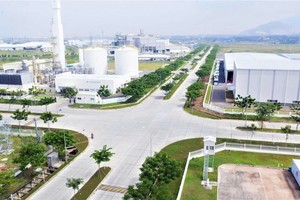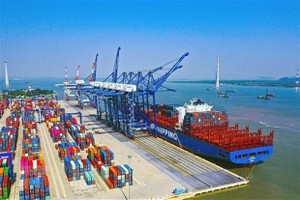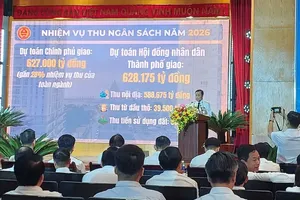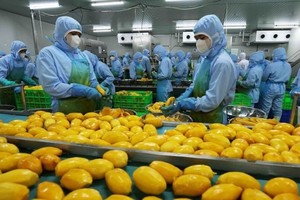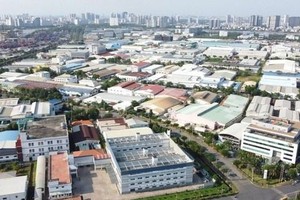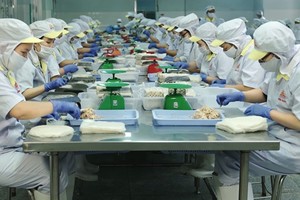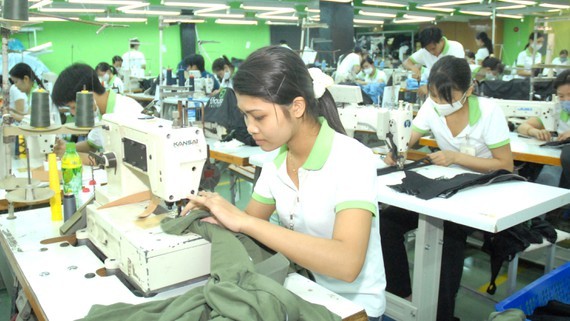
According to the Ministry of Industry and Trade (MoIT), exports in the first six months of this year saw a slight decrease of 1.1 percent over the same period last year, reaching only US$121.21 billion because the pandemic had caused the import partners to postpone or cancel orders of many key industries, such as textiles, footwear, and seafood.
According to the Vietnam Textile and Apparel Association (VITAS), in the first six months of the year, garment and textile exports have decreased by more than 19 percent. Of which, the export turnover of fiber and yarn decreased by 21.2 percent while it increased by 1.9 percent in the same period last year. Export turnover of cord fabric and technical fabric saw the strongest decrease of 39.6 percent while it climbed by 17.1 percent in the same period last year. As for textiles and apparels, which are key products, export turnover also dropped by 15.5 percent while it edged up by 10.4 percent in the same period last year.
According to the VITAS, the canceled and delayed orders are mainly from April to June this year. Of which, the Vietnam National Textile and Garment Group (Vinatex) alone lost up to 50 percent of orders in May, while large enterprises, such as Song Hong Garment, Viet Tien, Nha Be, and Thanh Cong, are no exception. By the end of June this year, the revenue that enterprises have gained mainly came from the production of cloth masks and medical protective equipment.
Similarly, the footwear manufacturing industry was negatively affected by Covid-19 pandemic. Footwear export turnover in the first six months of this year slid by 6.7 percent over the same period last year. The Vietnam Leather, Footwear and Handbag Association said that manufacturing enterprises have faced double difficulties: the shortage of imported raw materials and interrupted export to main export markets, especially the US and Europe, leading to a poor export turnover. The fisheries industry was also not much optimistic. Earlier this year, this industry encountered difficulties in the Chinese market, causing many enterprises to be on edge, now this market has gradually recovered, enterprises continue to face obstacles in Japan and the EU as the pandemic has broken in these countries.
At present, many firms say that although the market has slightly improved, it has not been able to recover to normalcy as before and they are struggling to open new markets to maintain operations or switch to producing other products for domestic consumption.
Highly appreciating the economic opportunities that the EVFTA brings, the Government has instructed ministries to remove difficulties for enterprises at all costs. Ministries and departments have started putting into operation the electronic Certificate of Origin (C/O) issuance system. This system will help businesses to reduce thousands of working days when they do not have to send documents to the C/O issuers and wait for them to return the issued C/O forms.
MoIT is also working with the European Union to promote the establishment of an e-commerce trading floor. This trading floor will integrate and provide sufficient information, executive tools of e-government, market access tools, and electronic import-export tools. In addition, regulations on trade, investment, technology, and technical barriers, in general, will be integrated and transparent on the exchange, helping enterprises to proactively adjust production in line with the European market. According to the MoIT, the fact that many countries close the borders, implement social distancing and suspend commercial flights has seriously affected the trade activities between enterprises, causing disruptions to export orders. This situation is expected to continue longer. Therefore, the establishment of an e-commerce exchange will help trade with foreign partners more easily and smoothly.
At the grassroots level, many provinces and cities also provide support for enterprises to take opportunities from the EVFTA. Typically, Ho Chi Minh City, according to Mr. Nguyen Thanh Phong, Chairman of the municipal People's Committee, to effectively implement free trade agreements, including the EVFTA, in the coming time, the city will continue to support enterprises to stabilize production and develop products; fully equip knowledge about the agreement for enterprises so that they can both take advantage of the agreement and protect themselves; complete the legal and policy framework. Regarding the long-term solution, the city will support firms to renovate machinery, equipment, and production lines, at the same time, promote regional connection to establish production chains and value chains. Thereby, it will create strength to help enterprises to improve competitiveness to successfully penetrate the European market.
From another perspective, Mr. Ly Hoang Hai, General Director of Eurofins Sac Ky Hai Dang Company, said that in order for Vietnamese goods to enter the EU market, authorities need to build a database to support export enterprises to quickly update changes in technical standards. State management agencies promptly issue regulations and policies in accordance with the EU’s requirements, opposing unreasonable regulations. At the same time, they should create connection hubs in the supply chain, from farmers to producers, importers, and technical intermediaries.
Obviously, the implementation of the EVFTA is being given attention by ministries and industries. If Vietnamese enterprises make use well of this opportunity, they will able to increase exports, expand the market, and revive production growth after the pandemic.




